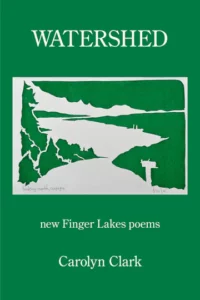 Review by Barbara Ellen Sorensen
Review by Barbara Ellen Sorensen
Beyond a simple piece of land separating waters, there is an expanse of field that we all must traverse. This unknown territory encompasses aging and death. Yet we shouldn’t let our demise be at the center of our world. With the strong poetic voice of Carolyn Clark to emulate, we can look upon the time of aging as one of generativity.
This watershed time can usher in the quiet space needed to come to terms with our shared humanity. As women, we may no longer be a hands-on mother to human children, but we can “mother” the ecosystems that we live in and ultimately depend on. We can in turn also protect and nurture the wildlife in those ecosystems. We can transform ourselves and become like the fearless goddesses of old, as in the poem, “Artemis Dream-Opening Day of Hunting Season:”
“In a flash I invoke Potnia Theron/Queen of Wild Animals…/
I promise myself/at night to look up her lovers-/
disloyal Orion…/
while all the while/
Artemis keeps on trying /
to protect her wild animals,/
desires only/
to keep them wild,/
wild and far away-/
procul harum-/
far from these things.” (17-18)
It is apropos to note that Artemis killed Orion because he wanted to kill every animal on earth. But all of those “stories are written in the stars” (18).
The poet recognizes, as we all eventually do, that her time on earth is limited. Through her poetry she moves emotionally and physically to explore her place in this new phase of life: “Almost a senior citizen-/with more time and less energy/to get things done” (19). “I shovel gingerly/grateful my back is now/bending in ways/that didn’t work last spring”(20).
Masks play a large part in Clark’s poetry. They are not only modern-day, medical masks in the midst of a pandemic; they simultaneously represent Clark’s constant summoning of the ancient Greek culture/mythology that she knows so well and finds everywhere. Clark’s writing melds the modern world of “well-coordinated volunteers jump/to make new light blue masks…/for all who soon will learn to wear masks,/people and children,/we all who now need masks” (31) with Greek mythology: “For how long, we may ask?/For as long as plague-bearing Apollo of the far-shooting arrows/binds us in his sight” (31).
The recognition of life’s tenuousness and vulnerability is mirrored in the Greek myths of long ago, reminding us that we are all now part of something larger and ultimately more dangerous than ourselves: “…for as long as merciless Fates-Clotho Lachesis, and dread Atropos-keep up their spin, apportion and cut us down/…to remind us of how fragile we humans are…/that’s how long we’ll need masks.:” (31).
Rather than inhabit the zone of fear during the Covid days, Clark pushed herself and others to stay alert and productive, maybe to even take a persona: “Write books, poetry, read and erase/imposed solitude of time and place./Wear a mask, a persona” (34). In this new age of disease, all of us must do what is necessary so that we can heed these directives: “feel no guilt/in rejoicing in nature…now transform to just one goal: survivor./I stay on, journaling in the dark” (34, 42).
Love is a key element in many of Clark’s poems: “This day and age redefine our roles/but the longings remain the same: “live first for love, sweet harmony,/and all else will fall in place.” In the poem, “Oblique” the love that the author wants to share is no longer erotic love but an emotion transcending human love that can be found in nature and in other human beings: “An old god,/Eros must have mixed up/his magic: this arrow/isn’t working/the way it should:/my heart is still/glowing with affection-for everyone/…the older goddess/Nature, is always there/when you need her” (75).
Ultimately, as a poet it is hope and tenacity that is most needed as we age. In “Spes (Hope) is All Around” Clark writes, “Hope alone had stayed, a solitary bright seed/strong, hard and alive, awaiting human need” (64).
Watershed by Carolyn Clark
Kelsay Books, 2024
978-1639802968
Barbara Ellen Sorensen is former senior editor of the American Indian Science & Engineering Society’s flagship publication, Winds of Change. Sorensen is a contributing writer to the Tribal College Journal. Sorensen has had three books of poetry published: Songs from the Deep Middle Brain (Main Street Rag, 2010), Compositions of the Dead Playing Flutes (Able Muse Press, 2013), and Mary’s River (Kelsay Books, 2018). Her first book was nominated in 2011 for a Colorado Book award.
